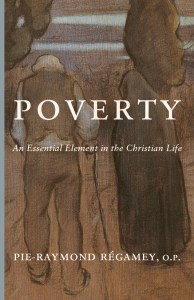We support our Publishers and Content Creators. You can view this story on their website by CLICKING HERE.
If spiritual poverty is not to sink on the one hand into resentment or nihilism, on the other into a greedy enjoyment—and in either event into despair—two enormous and closely connected truths must dominate it: first, that God transcends the world, and second, that happiness is not to be found on earth.
Poverty, by Pie-Raymond Régamey, O.P (Cluny Media, 228 pages)
 We have got to insist on the fact that renunciation as commanded in the Gospel does not entail a real hatred or scorn of the goods we are detaching our hearts from.
We have got to insist on the fact that renunciation as commanded in the Gospel does not entail a real hatred or scorn of the goods we are detaching our hearts from.
Only too often, among people professedly pious, contemptus mundi is nothing better than disdain rising out of insensibility, ignorance, or stupidity. We will not dwell on this, because its commonness does not make it any more interesting, but it should be noted.
What is more insidious is what Max Scheler, following on—Nietzsche, has studied under the name of “resentment.” This means that when our desire for a thing has been frustrated, we come to hate it. This desire may have sunk below the level of consciousness: indeed it may never have been conscious. All the same it turns sour. A man begins by criticizing and feeling a disgust towards goods he formerly coveted, and then extends this behavior to everything. The modern world is given to these resentments, and nothing is more opposed to poverty, though their external appearances are often much the same.
Nor does the poverty of the Gospel arise from a reaching-out towards nothingness. Such a pleasure is something very hard to explain and the state of soul a man must be in to feel it ought to be impossible. For it is a contradiction. Everything in us is positive and existent. How could man believe in, and how justify, nihilism—which considers goods of all kinds as nothing, and a lack of them as a good in itself? Yet such a philosophy has existed under various forms in the past, and is quite common today. It looks like a new evil of our time, more radically metaphysical than that of Chateaubriand’s René. “I’m glad that I’m not satisfied any more,” wrote Jacques Rivière to Claudel, to open their discussion, “that I can find no answer in anything. That was the first thing that drew me away from Catholicism. I didn’t want to be fed. I’d rather have my aching hunger, my anguish.”
This denial of good is even more basic than the scorn of the Manicheans for material things. Nihilism does not suppose that there are two principles, one good and one bad, with the bad one responsible for all things material; but, if it is consistent, it assumes that the ultimate reality is either evil or nonsense.
…the universe is only a blemish
On the purity of un-being,
cries the serpent in Genesis, according to Paul Valéry.
This state of mind gets hold even of Christians, though they do not always realize it. I read the following dialogue in a Protestant magazine: a Catholic says to a Protestant: “You haven’t got any saints.” To which the Protestant replies: “No! We are poor!”
This little sally is the result of much misunderstanding. The misunderstanding starts from the odd notion that poverty is something desirable in itself, even poverty of soul.
How much more then will this nihilism love poverty in matters which are not eternal. It would lead a man to a stupendous love of self-abasement (which even the great École française of the seventeenth century was tinged by). The theory of self-abasement becomes a grim frenzy when it is applied to the will. One does not stop short at the mortification one needs to straighten out disordered desires, but thinks that self-denial must put an end to all personal life.
They have the same attitude towards gifts of intellect. It is like certain of the simpler sort of anticlerical, who think that poverty in spirit means poverty of mind—stupidity. On principle they thrust from them those they love. They talk about “creatures” bitterly. There is nothing they regard save with a gloomy eye.
It is so very true that extremes meet. This “mystique of annihilation” provokes self-love to hidden rancors. Inversely, a desire to enjoy creatures may be expressed by an odd pleasure in being deprived of them. An example is Gide’s “dispossession”: “I preserve,” says Ménalque, “even among my riches, a sense that my condition is precarious, whereby I exasperate, or at least lighten the tone of my life.”
A love of poverty then becomes a search for self-enjoyment. It is often quite genuine. Earthly food really does taste of nothingness as long as we want to enjoy it in the passing moment as if we found eternity in it. “If you wished or understood it, Myrtil, at this moment, without your wife and children, you could be alone before God on earth. But you will keep remembering them: you bring everything with you, as if you were afraid of losing it—your past, all your loves, all your earthly cares.” I hate treating this delicious poetry so pedantically. But why must it claim to be reality? By all means let Myrtil have a holiday, nothing would be better for him; let him go into the fields and forget his wife and children to enjoy the beauties of the morning more totally—there I am entirely with Ménalque. That evening he will be better able to put into his over-hustling activity some of the divine innocence we get back to with nature. But what Ménalque seriously exhorts him to do is to get rid of the most divine part of his life: the accomplishment of the work set him by Providence and his love for his home. He actually thinks that Myrtil can put as much freshness of soul into them—even that his soul will find refreshment in them, if he will carry poverty to the point of not even desiring that refreshment. He does not understand real poverty; he thinks it is God giving Himself in exchange for a sacrifice cruel to others and inhuman in itself; where does he want us to look for God? In the purely perceived sensation “of this delightful morning, this mist, this pulsation of your being.” You soon begin to see that this doctrine presupposes a ghastly pantheism: “You can’t imagine, Myrtil, how many forms God takes; you blind yourself if you only look at one and fall in love with that. It grieves me to see your adoration so concentrated—I wish it could be spread out more. God is waiting behind every door you shut…. All God’s forms are lovable, and everything is God’s form.”
No, if spiritual poverty is not to sink on the one hand into resentment or nihilism, on the other into a greedy enjoyment—and in either event into despair—two enormous and closely connected truths must dominate it: first, that God transcends the world, and second, that happiness is not to be found on earth, we cannot find it in the present moment, time is not eternity but is only relative to it in the dark bareness of faith and hope.
Republished with gracious permission from Cluny Media.
Imaginative Conservative readers may use the code IMCON15 to receive 15% off any order of not-already discounted books from Cluny Media.
The Imaginative Conservative applies the principle of appreciation to the discussion of culture and politics—we approach dialogue with magnanimity rather than with mere civility. Will you help us remain a refreshing oasis in the increasingly contentious arena of modern discourse? Please consider donating now.
The featured image is “Twilight” (circa 1894-1900) by Ramon Pichot Gironés, and is in the public domain, courtesy of Wikimedia Commons.
Share This Story, Choose Your Platform!
Go to Top

 Conservative
Conservative  Search
Search Trending
Trending Current News
Current News 





